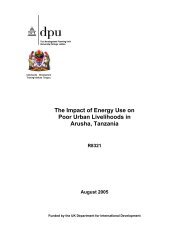EPA Review Annex Documents - DFID
EPA Review Annex Documents - DFID
EPA Review Annex Documents - DFID
You also want an ePaper? Increase the reach of your titles
YUMPU automatically turns print PDFs into web optimized ePapers that Google loves.
The main expectation of the process was one where the EU would significantly increase<br />
financial aid over and above the traditional EDF funding, so as to enable ACP countries<br />
to enhance their supply side capacities<br />
Resource constraints impact on negotiations<br />
The perception is that the constraints on negotiating capacity have affected <strong>EPA</strong><br />
negotiations significantly. It is believed that with more resources the country (and other<br />
ACP/ESA countries) could have conducted more detailed sectoral studies to get in-depth<br />
understanding of the merits and demerits of completing the <strong>EPA</strong>. Lack of resources was<br />
especially important in the areas of trade in services and SPS.<br />
Regional negotiation and integration<br />
The perception is that at the beginning of the process negotiations at the regional level<br />
were generally good, as most regional (ESA) member states had similar interests.<br />
However, positions changed and the fact that some ESA member countries signed an<br />
interim <strong>EPA</strong> with EU has weakened the outcome of ESA negotiations. This suggests that<br />
the prospects of integration process after the I<strong>EPA</strong>s may become more challenging.<br />
Intangibles<br />
The main intangible benefits from the process can be summarised as follows:<br />
• The country’s ability to negotiate in the area of trade has been sharpened<br />
• Basic knowledge on Cotonou Agreement, the WTO rules, experiences of other<br />
regional <strong>EPA</strong>s and awareness amongst wide spectrum have been created<br />
• Useful national and sectoral studies have been undertaken<br />
Incentives from assistance<br />
There is the perception that since most of the negotiation process and studies have<br />
been financed by the EU, it may do so expecting a positive return (i.e. concluding<br />
agreement). However, the perception is that national interest prevails above and beyond<br />
other issues, including the capacity created by donors. Funding by EU has instead<br />
enhanced the understanding of <strong>EPA</strong> issues by ESA countries (through trainings, studies<br />
etc), thus has facilitated effective negotiation positions from well informed Ethiopian<br />
negotiators.<br />
Lessons<br />
According to the case study, the main lessons can be summarised as follows:<br />
• The need for building in-house capacity<br />
• The need for strengthening regional voices<br />
• Civil society as partners to promote same cause<br />
• It is not easy to come to consensus when negotiating as a large group especially with<br />
varying interests<br />
• More resources are required, especially in areas such as funding of sectoral studies<br />
80
















